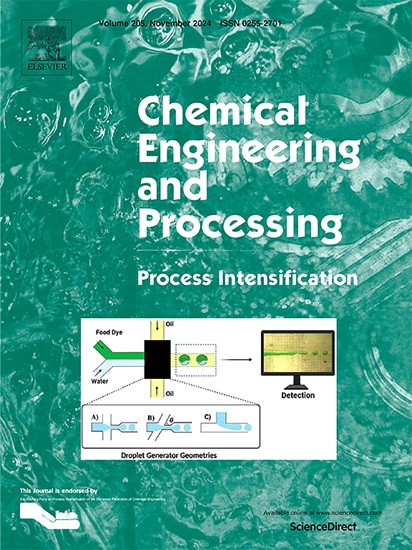工业甘油在液体培养基上的生物转化与短乳杆菌WLP 672的培养-乳酸生产
IF 3.8
3区 工程技术
Q3 ENERGY & FUELS
Chemical Engineering and Processing - Process Intensification
Pub Date : 2025-06-28
DOI:10.1016/j.cep.2025.110426
引用次数: 0
摘要
本研究旨在探讨甘油浓度对短乳杆菌乳酸产量的影响。结果表明,该菌株高效产乳酸,在添加甘油的培养基中发酵48 h后,乳酸浓度最高可达2.5 g/L。这些发现与其他微生物系统具有竞争力,例如鼠李糖乳杆菌,它们在不同条件下显示出相似的产量。该研究还强调了发酵优化的作用,包括甘油馏分调整和增强的监测技术,如紫外可见光谱和培养分析的显微镜。在优化的液体培养条件下,L. brevis WLP 672显示出将工业甘油(生物柴油的副产品)转化为乳酸的巨大潜力。这项研究强调了使用生物柴油衍生甘油作为底物的经济和环境效益,为废物增值和循环经济整合提供了可持续的途径。未来的发展方向包括代谢工程和共同培养策略,以提高乳酸生产力,与工业规模的应用相一致。总的来说,这项工作强调了微生物甘油生物转化作为生物技术和工业进步的可扩展和环保解决方案的可行性。本文章由计算机程序翻译,如有差异,请以英文原文为准。

Bioconversion of industrial glycerol on liquid medium with culture of Lactobacillus brevis WLP 672 - lactic acid production
This study aimed to investigate the effect of glycerol concentration on the lactic acid yield of Lactobacillus brevis. Results indicate that the strain efficiently produces lactic acid, achieving a maximum concentration of 2.5 g/L after 48 h of fermentation in a glycerol-supplemented medium. These findings are competitive with other microbial systems, such as Lactobacillus rhamnosus, which has shown similar yields under different conditions. The study also emphasizes the role of fermentation optimization, including glycerol fraction adjustments and enhanced monitoring techniques like UV–Vis spectroscopy and microscopy for culture analysis. L. brevis WLP 672 demonstrates significant potential for converting industrial glycerol, a biodiesel byproduct, into lactic acid under optimized liquid culture conditions.
This research underscores the economic and environmental benefits of using biodiesel-derived glycerol as a substrate, offering a sustainable pathway for waste valorisation and circular economy integration. Future directions include metabolic engineering and co-culture strategies to enhance lactic acid productivity, aligning with industrial-scale applications. Overall, this work highlights the feasibility of microbial glycerol bioconversion as a scalable and eco-friendly solution for biotechnological and industrial advancements.
求助全文
通过发布文献求助,成功后即可免费获取论文全文。
去求助
来源期刊
CiteScore
7.80
自引率
9.30%
发文量
408
审稿时长
49 days
期刊介绍:
Chemical Engineering and Processing: Process Intensification is intended for practicing researchers in industry and academia, working in the field of Process Engineering and related to the subject of Process Intensification.Articles published in the Journal demonstrate how novel discoveries, developments and theories in the field of Process Engineering and in particular Process Intensification may be used for analysis and design of innovative equipment and processing methods with substantially improved sustainability, efficiency and environmental performance.

 求助内容:
求助内容: 应助结果提醒方式:
应助结果提醒方式:


